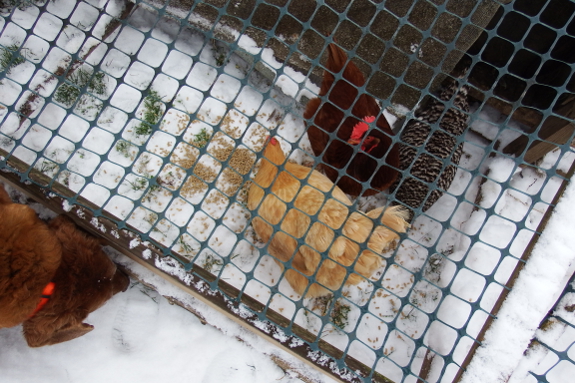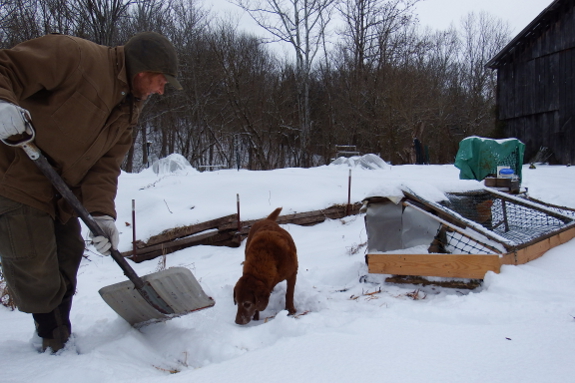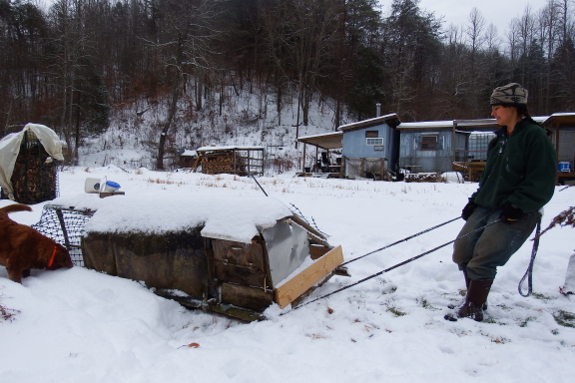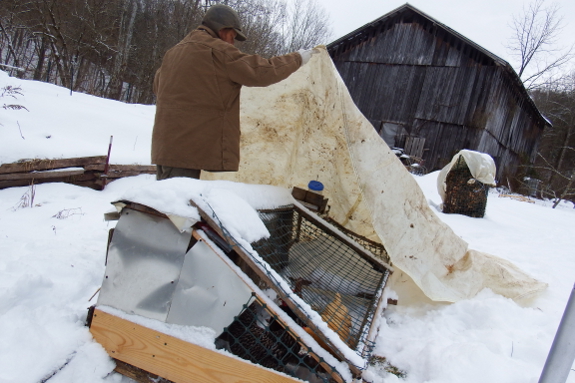
Chicken tractors in winter

We have both a stationary
coop and a chicken tractor. The former houses the majority of our
birds, while the latter gets the mavericks who like to fly over fences
and scratch in the garden. If we didn't have a tractor, these ladies
wouldn't be back in the coop...they'd be in the pot.
I used to worry about
tractored hens in the winter, but as long as you manage them carefully
they don't seem to suffer at all from their more exposed conditions. Our lay rates are actually superior in the winter tractor
despite having no lights, perhaps because the tractored hens eat about
40% more laying pellets than the coop birds do. (Other possibilities ---
higher-laying hens are more likely to fly fences; tractored hens just
don't have much to do other than lay eggs. It's hard to tease out the
reasons on such a small scale.)

All of that said, tractoring chickens in the winter is a bit more work. If we had snow cover all winter, we wouldn't do it since there's be no point --- the tractor would just be a small stationary coop. Even in our zone 6 climate, we still have to change out waterers daily in freezing weather in the tractor rather than using a heated waterer, which adds to the daily work load. So, no, tractors aren't quite as easy as cooped up birds.

On the other hand, it's
handy to be able to fertilize the garden directly with a tractor during
the fallow season. As I mentioned earlier, it's nice to be able to
ground bad birds slightly less permanently than if we ate them. And Lucy
thinks it's particularly nice to get her daily dose of chicken manure
when I move the tractor. (Yes, I move the tractor every day, unless it's
snowing.)

Just remember to put a tarp over the tractor before it
snows rather than afterwards and you'll be all set. And if you're going
to have to leave your tractor in one place for more than a few days,
treat the hens to some leaf bedding. Oh, and do be sure to keep them on
dry ground if at all possible.
Do all of those things and you'll have happy, healthy hens even in January.
Want more in-depth information? Browse through our books.
Or explore more posts by date or by subject.
About us: Anna Hess and Mark Hamilton spent over a decade living self-sufficiently in the mountains of Virginia before moving north to start over from scratch in the foothills of Ohio. They've experimented with permaculture, no-till gardening, trailersteading, home-based microbusinesses and much more, writing about their adventures in both blogs and books.
Want to be notified when new comments are posted on this page? Click on the RSS button after you add a comment to subscribe to the comment feed, or simply check the box beside "email replies to me" while writing your comment.
- Remove comment
